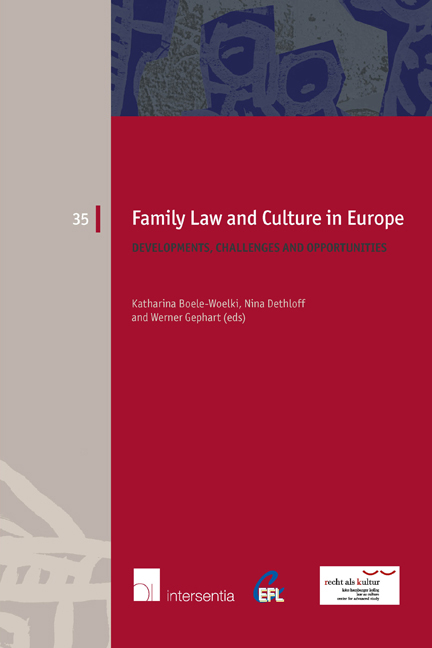Book contents
- Frontmatter
- Preface
- Contents
- List of Authors
- PART ONE THE CEFL PRINCIPLES ON PROPERTY RELATIONS BETWEEN SPOUSES
- PART TWO BREAKUP OF (NON-)FORMALISED RELATIONSHIPS
- PART THREE NEW CONCEPTS OF PARENTAGE
- The Right of the Child to Parents
- Contracting on Parentage
- Biological and Social Parenthood
- France: Biological and Social Parentage
- Anonymous Relinquishment and Baby-Boxes: Life-Saving Mechanisms or a Violation of Human Rights?
- Cross-Border Surrogacy: Time for a Convention?
- Re-Thinking Family Law: A New Legal Paradigm for Stepfamilies?
- PART FOUR INTERNATIONAL FAMILY RELATIONSHIPS
- PART FIVE TRANSNATIONAL FAMILIES: ACROSS NATIONS AND CULTURES
- EUROPEAN FAMILY LAW SERIES
Biological and Social Parenthood
from PART THREE - NEW CONCEPTS OF PARENTAGE
Published online by Cambridge University Press: 22 November 2017
- Frontmatter
- Preface
- Contents
- List of Authors
- PART ONE THE CEFL PRINCIPLES ON PROPERTY RELATIONS BETWEEN SPOUSES
- PART TWO BREAKUP OF (NON-)FORMALISED RELATIONSHIPS
- PART THREE NEW CONCEPTS OF PARENTAGE
- The Right of the Child to Parents
- Contracting on Parentage
- Biological and Social Parenthood
- France: Biological and Social Parentage
- Anonymous Relinquishment and Baby-Boxes: Life-Saving Mechanisms or a Violation of Human Rights?
- Cross-Border Surrogacy: Time for a Convention?
- Re-Thinking Family Law: A New Legal Paradigm for Stepfamilies?
- PART FOUR INTERNATIONAL FAMILY RELATIONSHIPS
- PART FIVE TRANSNATIONAL FAMILIES: ACROSS NATIONS AND CULTURES
- EUROPEAN FAMILY LAW SERIES
Summary
Questions of biological and social parenthood are posing great challenges to German constitutional law. In the field of parenthood two decisions of the German Constitutional Court can be highlighted. The first one is a judgment from 2003 on the rights of biological fathers which addresses biological parenthood as well as social parenthood. This ruling was a first step in strengthening the position of biological fathers. The other judgment was rendered in February 2013 when the Court held that the non-admission of successive adoption by registered civil (same-sex) partners is unconstitutional, and furthermore stated that same-sex parents can be considered to be parents in the sense of the Basic Law, and are thus protected by constitutional law, if the formal status of parenthood has been assigned to them by private law.
SUPREMACY OF LEGAL PARENTHOOD
The Federal Constitutional Court largely follows the decisions taken by the parliamentary legislator: German constitutional law mainly focuses on legal parenthood as assigned by private law rules on descent. It is important to note that German private law rules on descent implicitly assume a close correlation between legal and biological parenthood.
In German constitutional law the fundamental right to family relations (Article 6 of the German Basic Law) includes a specific fundamental right of parenthood. Under Article 6 paragraph 2 of the German Basic Law the ‘care and upbringing of children is the natural right of parents and a duty primarily incumbent upon them’. Calling this right a ‘natural’ right seems to imply that the main criterion for parenthood is biological parenthood. However, this would be a false conclusion, even though in the majority of cases biological parents are indeed the holders of parental rights.
Under constitutional law the status of parenthood is closely tied to subconstitutional rules, notably the provisions of the BGB – the German Civil Code. The Federal Constitutional Court generally considers the very same person who is a parent by subconstitutional family law to be the holder of the fundamental right of parenthood under Article 6 paragraph 2 of the Basic Law. Whether parenthood is rather a biological concept or a social one therefore depends on German private law.
- Type
- Chapter
- Information
- Family Law and Culture in EuropeDevelopments, Challenges and Opportunities, pp. 169 - 174Publisher: IntersentiaPrint publication year: 2014



